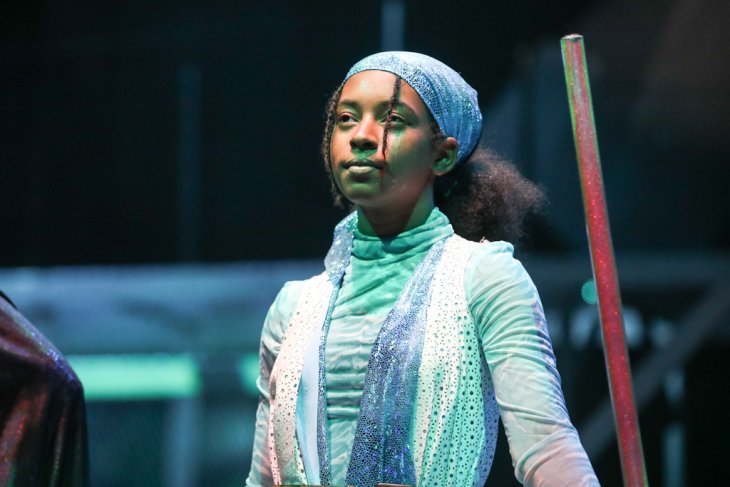Features
Amara Nwuneli: What Nigerian Children Want From The Next Administration

On Saturday the 25th of February 2023, as Nigerians above the age of 18 across the nation cast their ballots, the country’s children did not rest. Despite being too young to vote, we understood that our opinions and concerns about the future of our nation could not be ignored. That is why we came together under Fight Global Warming Nigeria, a movement hosted by me, to participate in a virtual discussion platform called #OurVoiceMattersToo. From all corners of the world, Nigerian youth engaged in thoughtful conversations about the issues that mattered to us and how we could shape the future of our country.
This panel provided the opportunity for the participants to not only learn about activism but it challenged them to look at modern-day Nigeria, identify the problems they faced and brainstorm solutions. Inspired by a speech given by Oluwaseyi Moejoh and splitting into breakout rooms, everyone was able to identify a part of the problems and used their knowledge to work out solutions. #OurVoiceMattersToo fostered an open space for active discussion about the need for movements that inspire change and how young people can advocate for what they believe in if they are motivated enough. Through this critical engagement, three essential concerns that they, as representatives of the young generation, want to see from the Nigerian government were produced.
Firstly, there is an immediate need for genuine government transparency. This accountability, fostered through regular dialogues with the citizens, would fuel a real-time active portal for information dissemination. We firmly believe that government transparency is the solution needed to rebuild the trust between citizens and the ruling class of this nation. Through effective and regular communication with the citizens, including regular engagement circulated through media including social media, radio and television, and town hall meetings, information on the visions, objectives, investments, clear steps and rules and regulations, will be shared and understood by all. We must know what the government is doing to improve the lives of the citizens, especially the children. We as young citizens deserve to feel protected and respected enough by the government to be able to directly access information regarding our country. There should be an active website, with daily updates where we can find data on how resources are being deployed to address our education, health care, safety, societal welfare and future. Without this, there will definitely be a lack of trust.
Secondly, there is an urgent need to initiate a youth parliament and active youth participation in every committee and government advisory council. While “youth” has been widely defined as anyone under 40 years old, we must stress the need to revert to the United Nations classification of youth as between 16 and 24 years old. If there is no adequate or sufficient time and money put into child literacy and education to develop their skills and talents, the future of Nigeria would look exponentially grim. Anybody with the skills and talents to help Nigeria evolve would most likely either leave the country or devote their time and energy somewhere else. It is imperative that we take care and nurture adolescents of every class all over the country and this duty is firmly the responsibility of the government. Some simple solutions include initiating school-wide competitions that award gifted and talented students, engaging young people in decision-making, and investing more in public and government schools to assure proper education for youths everywhere.
Thirdly, we need urgent investments in our healthcare systems. This is a critical need because the health and wellness of a country’s citizens are directly linked to the productivity and prosperity of the nation. For a clock to work and keep an accurate rhythm, all the gears and screws have to be properly greased and fixed. Similarly, for our youths to be productive, our healthcare system needs proper attention. If resources and infrastructure are effectively and properly used in the public health sector, there will be an increase in national output, more efficient projects executed, less crime committed, less migration, and improvement in the lives of those plagued with illnesses. Tangible solutions generated include: Hosting government initiatives that reach low-income areas and offer health relief, building a relationship between the public and private health sectors to create avenues for cross-sector partnerships, enacting health care plans for families and individuals who have to deal with lifelong illnesses and, investing in training healthcare facilities and professionals.
Although these are only a few of the many needs identified and hashed out, something that we can all agree on is the danger of patience. If we, as youths, and whoever reading this, simply complain about issues and gaps in government services then no proper change is going to happen. As Abraham Lincoln once said, “we cannot just dream for our future, we have to be the ones to create it.” Regardless of what happens to Nigeria over the course of the next decade, the people that will bear the impact the most are the children. Not only are we going to inherit this nation, but we are going to be the ones who will suffer the consequences of our choices or lavish in the prosperity of today’s innovations. Our voices will always matter and our thoughts will always count and reveal important insights, but what we hope is that the president is ready to listen.
_
Amara Nwuneli is a 15-year-old social and climate activist.
***






















